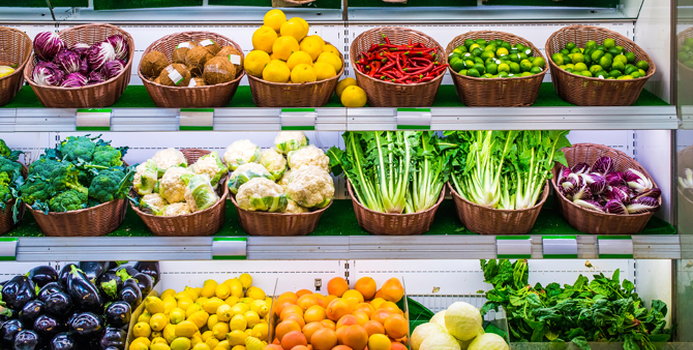Almost 90 percent of Americans fail to consume the recommended amounts of vegetables per day, and nearly 80 percent fail to meet dietary suggestions for fruit. However, recent studies have revealed one easy solution: frozen. When comparing a fresh, leafy plant to a frozen bag of mixed veggies, the fresh varieties may seem like a natural standout for superior nutrition. However, research has shown that the two are not all that different nutritionally.
Fresh Fruits and Vegetables
The fresh fruits and vegetables lining your produce aisle are typically picked before they are able to reach their peak ripeness. This gives distributors a cushion of time to ship it across the country and to get it on your shelves before they fully ripen. While this helps to ensure the availability of appealing-looking produce, it also gives those fruits and vegetables less time to develop a full spectrum of vitamins and minerals. Additionally, most produce must travel long distances to reach their final destination, being exposed to varying amounts of heat and light along the way. This may diminish or degrade some of the more sensitive vitamins in the produce.
Fresh fruits and vegetables also produce enzymes which cause a natural ripening, accompanied by a gradual loss of color, flavor and nutrients after harvest. This means that as soon as that produce is picked, it naturally starts to decay. While each vitamin and mineral have their own sensitivities, as a whole, fresh fruits and vegetables tend to lose nutrients up until they are eaten. Accordingly, fresh, local produce eaten soon after harvest and properly stored at cool temperatures between harvest and consumption are ideal for maximum nutrient content.
Frozen Fruits and Vegetables
Produce chosen for freezing tend to be picked at their peak ripeness, a time when (as a general rule) they are the most nutrient-packed. After harvest, they are processed immediately, minimizing the time for initial nutrient losses. The freezing process entails blanching the produce in hot water or steam to kill any bacteria and to halt the food-degrading enzymes. While some water-soluble vitamins, such as vitamin C and B, are sensitive to this and may be partially degraded or lost, frozen fruit and vegetables generally keep a majority of their nutritive value when processed. Therefore, the subsequent flash-freezing locks the produce in a relatively nutrient-rich state.
Proper storage is critical when maintaining the nutrient content of frozen produce. Excessive oxidation can cause the loss of some additional nutrients over time, so the longer it sits in the freezer, the less nutrition it will provide overall. However, in general, produce handled properly and frozen promptly after harvest can be just as nutritious as fresh produce that has been held many days after harvest.
Today, Americans typically eat only one-third of the recommended daily intake of fruits and vegetables. Frozen produce is one convenient and often inexpensive way to incorporate more fruits and vegetables into your diet. Especially within the winter months when fresh produce is harder to acquire (and often more expensive), frozen varieties provide an easy alternative. In short, fruits and vegetables in any form are better than none at all. Whether it's a trip down the frozen food aisle or a spin through the produce department, keeping your pantry stocked is important in maintaining a healthy, balanced diet.
Sarah Dreifke is a freelance writer based in DeKalb, IL with a passion for nutrition education and the prevention of chronic disease. She holds a Bachelor of Science in both Dietetics and Life Sciences Communication from the University of Wisconsin-Madison. Currently, she is working towards a combined Master's Degree in Nutrition and Dietetics as well as a dietetic internship at Northern Illinois University.




